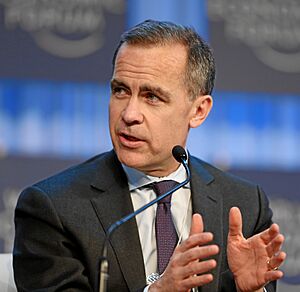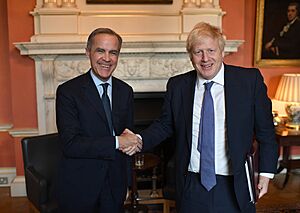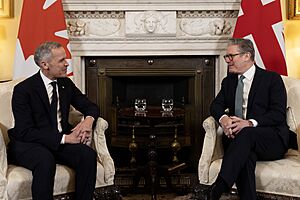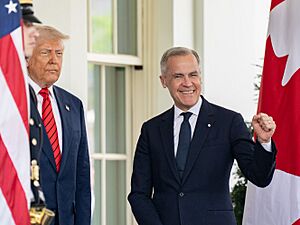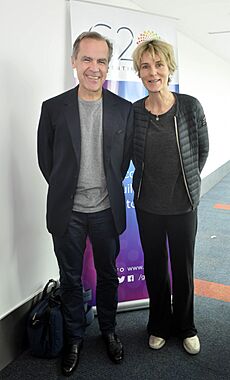Mark Carney facts for kids
Quick facts for kids
Mark Carney
|
|||||||||||||||||||||||||||||||||||||||||||
|---|---|---|---|---|---|---|---|---|---|---|---|---|---|---|---|---|---|---|---|---|---|---|---|---|---|---|---|---|---|---|---|---|---|---|---|---|---|---|---|---|---|---|---|

Carney in 2020
|
|||||||||||||||||||||||||||||||||||||||||||
| 24th Prime Minister of Canada | |||||||||||||||||||||||||||||||||||||||||||
| Assumed office March 14, 2025 |
|||||||||||||||||||||||||||||||||||||||||||
| Monarch | Charles III | ||||||||||||||||||||||||||||||||||||||||||
| Governor General | Mary Simon | ||||||||||||||||||||||||||||||||||||||||||
| Preceded by | Justin Trudeau | ||||||||||||||||||||||||||||||||||||||||||
| Leader of the Liberal Party | |||||||||||||||||||||||||||||||||||||||||||
| Assumed office March 9, 2025 |
|||||||||||||||||||||||||||||||||||||||||||
| Preceded by | Justin Trudeau | ||||||||||||||||||||||||||||||||||||||||||
| Member of Parliament for Nepean |
|||||||||||||||||||||||||||||||||||||||||||
| Assumed office April 28, 2025 |
|||||||||||||||||||||||||||||||||||||||||||
| Preceded by | Chandra Arya | ||||||||||||||||||||||||||||||||||||||||||
|
|||||||||||||||||||||||||||||||||||||||||||
|
|||||||||||||||||||||||||||||||||||||||||||
| Personal details | |||||||||||||||||||||||||||||||||||||||||||
| Born |
Mark Joseph Carney
March 16, 1965 Fort Smith, Northwest Territories, Canada |
||||||||||||||||||||||||||||||||||||||||||
| Citizenship |
|
||||||||||||||||||||||||||||||||||||||||||
| Political party | Liberal | ||||||||||||||||||||||||||||||||||||||||||
| Spouse |
Diana Fox
(m. 1994) |
||||||||||||||||||||||||||||||||||||||||||
| Children | 4 | ||||||||||||||||||||||||||||||||||||||||||
| Alma mater | |||||||||||||||||||||||||||||||||||||||||||
| Signature |  |
||||||||||||||||||||||||||||||||||||||||||
| Scientific career | |||||||||||||||||||||||||||||||||||||||||||
| Thesis | The dynamic advantage of competition (1995) | ||||||||||||||||||||||||||||||||||||||||||
| Doctoral advisor | Margaret A. Meyer | ||||||||||||||||||||||||||||||||||||||||||
| Influences | Galbraith • Schumpeter | ||||||||||||||||||||||||||||||||||||||||||
|
|||||||||||||||||||||||||||||||||||||||||||
Mark Joseph Carney (born March 16, 1965) is a Canadian politician and economist. He became the 24th prime minister of Canada in 2025. He has also been the leader of the Liberal Party and a Member of Parliament (MP) for Nepean since 2025.
Carney was born in Fort Smith, Northwest Territories, and grew up in Edmonton, Alberta. He earned a bachelor's degree in economics from Harvard University in 1987. Later, he studied at the University of Oxford, getting a master's degree in 1993 and a doctorate in economics in 1995. He worked at the investment bank Goldman Sachs before joining the Bank of Canada in 2003. In 2004, he became a senior associate deputy minister for the Department of Finance Canada.
Carney served as the eighth governor of the Bank of Canada from 2008 to 2013. He managed Canada's monetary policy during the 2008 financial crisis. During this time, he also chaired the Financial Stability Board from 2011 to 2018. After his time at the Bank of Canada, he became the 120th governor of the Bank of England from 2013 to 2020. There, he guided the British central bank through Brexit and the start of the COVID pandemic.
After leaving central banking, Carney worked in both private and public roles. He chaired Bloomberg L.P. and led impact investing at Brookfield Asset Management. In December 2019, United Nations Secretary-General António Guterres named him Special Envoy for Climate Action and Finance. Carney also advised Canadian Prime Minister Justin Trudeau during the COVID pandemic. In 2023, he became co-chair of the World Bank's private sector investment lab.
In January 2025, after Justin Trudeau resigned, Carney announced he would run for the leadership of the Liberal Party. He won by a large margin in March. Soon after, he became prime minister. He then called a federal election. He led the Liberal Party to a minority government, winning their fourth straight term since 2015. He also won a seat in Parliament for the first time.
Contents
Early Life and Education
Mark Joseph Carney was born on March 16, 1965, in Fort Smith, Northwest Territories. He grew up in Edmonton, Alberta, in the Laurier Heights area. He has three siblings: an older brother Seán, an older sister Brenda, and a younger brother Brian.
His mother, Verlie Margaret, was a stay-at-home mom who later became an educator. His father, Robert James Martin Carney, was a high school principal and a professor at the University of Alberta. His father ran for political office in 1980. Three of Carney's four grandparents were from Ireland.
Carney graduated from St. Francis Xavier High School in Edmonton in 1983. He then attended Harvard University with a scholarship. At Harvard, he was a backup goalie for the varsity ice hockey team. He graduated in 1987 with a bachelor's degree in economics.
After Harvard, he went to the University of Oxford in Europe. He earned a master's degree in economics in 1993 and a doctorate in economics in 1995. His doctoral advisor was Margaret Meyer. While at Oxford, he co-captained the Oxford University Ice Hockey Club.
In 2021, he was elected to Harvard University's Board of Overseers. He resigned in early 2025 when he became leader of the Liberal Party.
Financial Career
Carney worked for thirteen years at Goldman Sachs, an investment bank. He worked in their offices in Boston, London, New York City, Tokyo, and Toronto. He held important roles, including managing director for investment banking. He helped South Africa enter international bond markets after post-apartheid. He also worked on issues related to the 1998 Russian financial crisis.
In 2003, Carney left Goldman Sachs to become a deputy governor at the Bank of Canada. A year later, he joined the Department of Finance Canada as a senior associate deputy minister. He started this role on November 15, 2004.
From 2004 to 2007, Carney was a senior associate deputy minister and a G7 deputy in the Department of Finance Canada. He worked under two finance ministers. During this time, he oversaw the government's plan to tax income trusts. He also led the profitable sale of the government's share in Petro-Canada.
Governor of the Bank of Canada (2008–2013)
In October 2007, Carney was chosen to be the Governor of the Bank of Canada. He left his finance position to advise the outgoing governor, David Dodge. He officially took over on February 1, 2008. Carney was the youngest central bank governor among the G8 and G20 nations when he was appointed.
Handling the 2008 Financial Crisis
Carney's actions as Governor of the Bank of Canada helped Canada avoid the worst effects of the 2008 financial crisis.
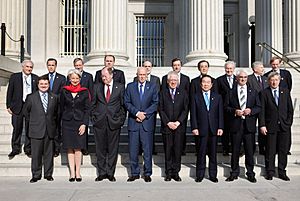
One key decision was cutting the overnight interest rate by 50 basis points in March 2008. This was just one month after he became governor. While other banks raised rates, Carney predicted a global financial crisis. When interest rates in Canada reached their lowest point, the central bank promised to keep them low for at least one year. This helped boost credit and confidence. Canada's economy recovered faster than other G7 countries. It was the first G7 nation to return to pre-crisis levels of economic output and employment.
The Bank of Canada also provided a lot of extra money to the financial system. This, along with the promise of low interest rates, helped Canada get through the crisis.

However, the very low interest rates led to higher housing prices and more household debt. In 2012, Carney admitted some parts of the housing market were "overvalued." He said low rates were not the only cause. He believed individuals, banks, and government rules also played a part. Before he left, some people wanted to raise rates because Canadians had record debt.
Canada's careful financial rules also helped. In 2009, a Newsweek writer said Canada was "thriving" in the crisis. Canadian banks were strong and could take advantage of new opportunities.
Carney received many awards for his leadership during the crisis. He was named one of Financial Times's "Fifty who will frame the way forward." Time Magazine included him in its 2010 Time 100 list. In 2012, Euromoney magazine named him "Central Bank Governor of the Year."
International Roles
Carney chaired the Bank for International Settlements' Committee on the Global Financial System from 2010 to 2012.
He was also a member of the Group of Thirty, a group of top financiers and academics. He was on the Foundation Board of the World Economic Forum.
On November 4, 2011, Carney became chairman of the Financial Stability Board (FSB). The FSB helps coordinate financial rules worldwide. Carney said his appointment showed the strong reputation of Canada's financial system. His three-year term was part-time, allowing him to finish his work at the Bank of Canada. He was reappointed for a second term in 2014, which ended in 2018.
Governor of the Bank of England (2013–2020)
On November 26, 2012, Chancellor of the Exchequer George Osborne announced Carney's appointment as Governor of the Bank of England. He took over from Sir Mervyn King on July 1, 2013. He was the first person not from Britain to hold this role since the Bank of England started in 1694. The Bank of England gained new powers in 2013, like setting bank capital requirements. Carney initially planned to serve for five years, but extended his term.

Carney made the Bank of England more open by appearing in the media more often. He introduced "forward guidance," a policy where the Bank would not raise interest rates if unemployment was above 7%. This aimed to encourage business lending. However, this policy was seen as confusing due to its many conditions.
In May 2014, Carney warned that the UK's rising housing market was a big risk to financial stability. He said that the lack of affordable housing in the UK was due to limited supply. He noted that Canada built twice as many homes as the UK, even with half the population. Carney assured the public that the Bank was watching property prices to prevent economic problems.
In 2014, Carney warned that if Scotland voted for independence, it likely could not keep using the pound sterling without giving up some powers to the UK.
Before the 2016 Brexit referendum, Carney warned that leaving the European Union could cause an economic slowdown. After the vote to leave, he announced that the financial system would remain stable. The bank then cut interest rates and restarted quantitative easing. At the request of Prime Minister Theresa May, Carney extended his term to help with Brexit negotiations. He further extended it to ensure a smooth transition to his successor, Andrew Bailey.
At the start of the COVID-19 pandemic in the United Kingdom, as Carney was about to leave his role in March 2020, the bank cut interest rates. This was to protect against the expected economic impact of the pandemic.
After Central Banking (2020–2024)
In 2020, Carney advised Canadian Prime Minister Justin Trudeau on Canada's economic response to the COVID-19 pandemic. This led to speculation that Carney might become Canada's Minister of Finance or even prime minister.
In October 2020, Carney became vice chairman at Brookfield Asset Management (BAM). He led the firm's environmental, social and governance (ESG) investment strategy. In February 2021, Carney corrected an earlier statement that Brookfield's portfolio was carbon neutral. He had based this on their large renewable energy investments. Critics said this was misleading because it did not account for emissions from their investments in fossil fuels.

In 2020, Carney launched the Taskforce on Scaling Voluntary Carbon Markets. This group aims to increase trading of carbon offsets. Its members include leaders from various financial and industrial companies. Carney stated that a global carbon offset market was "imperative" to reduce emissions.
In February 2021, Carney joined the board of the financial technology company Stripe. He also helped launch the Glasgow Financial Alliance for Net Zero (GFANZ) at COP26 in Glasgow in November 2021. He co-chairs this group. From 2022 to January 2025, Carney advised Watershed, a climate technology company. In August 2023, Michael Bloomberg named Carney as chair of the new board of directors for Bloomberg L.P..
In September 2024, Carney became a special adviser and chair of the Liberal task force on economic growth. It was later revealed that Brookfield Asset Management had asked the federal government for funds for a Canadian asset fund. Carney did not need to follow standard ethical rules because he worked for the Liberal Party, not the Prime Minister's Office.
Political Beginnings
In 2012, Canadian Prime Minister Stephen Harper asked Carney to join the Conservative government as minister of finance. Carney, who was then governor of the Bank of Canada, declined. He felt it was not right to go directly from being a central bank governor into politics.
The Liberal Party also approached Carney to run for leader in their 2013 leadership election. He chose not to.
As he prepared to leave the Bank of England, Carney was appointed as a United Nations special envoy for climate action and finance in March 2020. In January 2020, UK Prime Minister Boris Johnson named Carney as a finance advisor for the UK presidency of the COP26 United Nations Climate Change conference in Glasgow.
In 2021, Carney spoke at the Liberal Party policy convention, showing his support for the party. However, he said he would not run in the 2021 Canadian federal election due to his COP26 commitments.
Carney supported Catherine McKenney for mayor of Ottawa in the 2022 mayoral election.
In October 2023, he endorsed Rachel Reeves of the UK Labour Party to be the next chancellor of the exchequer. After Labour won the 2024 election, Carney was part of a group that helped create a British National Wealth Fund.
On September 9, 2024, Justin Trudeau named Carney to chair the Liberal Party of Canada's Task Force on Economic Growth. His name was briefly mentioned as a possible candidate for finance minister after Chrystia Freeland resigned.
Leader of the Liberal Party
2025 Leadership Election
On January 16, 2025, Carney officially announced he was running in the 2025 Liberal Party of Canada leadership election. He stepped down from all his executive, board, and advisory roles to focus on his campaign. By February 9, his campaign had raised over $1.9 million from more than 11,000 people. He also received support from 66 Liberal Members of Parliament. Carney won on the first ballot with over 85.9% of the vote, becoming the leader of the Liberal Party. His victory margin was larger than Justin Trudeau's in 2013.
Prime Minister of Canada (2025–Present)
44th Canadian Parliament
On March 14, 2025, five days after winning the leadership election, Carney was sworn in as the 24th prime minister of Canada. He also formed the 30th Canadian Ministry. He became the first Canadian prime minister born in a territory (not a province). He is also the second prime minister with a PhD. He is the first prime minister to have never held an elected office before.
In his first act as prime minister, Carney signed a directive to end the consumer carbon tax by April 1. He also made sure that April's carbon rebate would continue. This directive was approved by an order in council signed by Governor General Mary Simon. Carney's first foreign visits were to France and the United Kingdom on March 17. He met with King Charles III for the first time as prime minister during his UK visit.
2025 Federal Election
Many expected Carney to call a federal election in late April or early May 2025. On March 22, the Liberal Party announced Carney would run in the Nepean riding in Ottawa. On March 23, Carney visited Governor General Mary Simon. He asked to dissolve parliament and call an election for April 28. Carney and the Liberal Party won the election, getting 169 seats. They were 3 seats short of a majority. Carney also won the Nepean riding.
45th Canadian Parliament
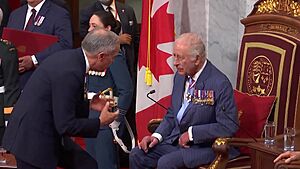
To open the 45th Canadian Parliament, Prime Minister Mark Carney invited King Charles III to deliver the Speech from the Throne. This was a symbolic act to affirm Canada's independence. The speech mentioned the government's plan to join ReArm Europe, a European defense group. In June 2025, Canada hosted the 51st G7 summit in Kananaskis, Alberta. Carney opened the summit and invited other world leaders. Carney's government passed its first major law, Bill C-5, the One Canadian Economy Act, in the same month. This bill removes federal barriers to trade within Canada.
Views and Policies
Carney is seen as a moderate, centrist, and technocratic leader. He is described as a "Blue Grits" Liberal, meaning he supports economically liberal (or fiscally conservative) and socially liberal ideas.
In 2023, Carney spoke about the need to build "health care, infrastructure, schools, opportunity, sustainability and prosperity." He used the phrase "masters of our own house," which is linked to Canada's Quiet Revolution.
Economic Views
Wealth Inequality
In 2011, Carney called the Occupy Wall Street protests "constructive." He noted frustrations, especially in the United States, about inequality and the growing gap between CEO and worker pay. In December 2016, Carney warned about the danger of "staggering wealth inequalities." He pointed out that the richest 1% of Americans held 25% of the wealth in 1990, which grew to 40% by 2012. Globally, the richest 1% held one-third of the wealth in 2000, rising to half by 2010.
Monetary Policy
On August 23, 2019, Carney gave a speech about challenges for monetary policy. He said the widespread use of the US dollar in trade was "destabilizing" the global economy. About 50% of international trade uses the US dollar, which is much more than the US's share of global trade. This is a problem when the US economy is strong but other economies are weak.
Carney urged central banks to work together to find an alternative to the US dollar as the main reserve currency. He suggested a "new Synthetic Hegemonic Currency" (SHC), possibly through digital currencies from central banks. This would reduce the US dollar's strong influence on global trade.
Fiscal Policy
After becoming Prime Minister, Carney reversed the previous government's capital gains tax increase. He promised to cut taxes for the middle class. He also planned a new way of federal budgeting to save taxpayers money.
Foreign Policy
Brexit
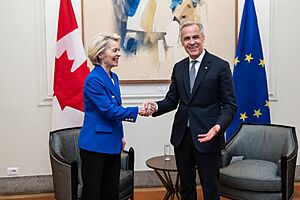
Carney often warned that Brexit would negatively affect the UK economy. Some Brexit supporters accused him of favoring the UK staying in the European Union (EU). He replied that it was his duty to speak on such important issues.
In September 2018, Philip Hammond, the chancellor of the Exchequer, confirmed Carney would stay as Governor until January 2020. This was to ensure a "smooth" transition after the UK was set to leave the EU.
In February 2019, Carney offered a less negative view on Brexit. He said that globalization had caused "imbalances of democracy and sovereignty." He suggested that Brexit was a test for a new global order.
NATO
In February 2025, Carney promised to spend 2% of Canada's GDP on defense by the end of 2030. This is the target set by NATO. In June 2025, he promised to reach the 2% target by March 2026. He also aimed for NATO's new 5% of GDP target by 2035.
Iran–Israel Conflict
After the Israeli attacks on Iran in June 2025, Carney stated that "Israel has the right to defend itself." He also called for calm and restraint.
India
Under Prime Minister Mark Carney, Canada–India relations have improved after tensions during Justin Trudeau’s time. Carney hosted Indian Prime Minister Narendra Modi at the 2025 G7 summit. Both leaders focused on shared goals like clean energy, artificial intelligence, and fighting terrorism. India's Ministry of External Affairs announced plans to restart high-level talks and trade negotiations. These steps show a new commitment to stronger ties.
On June 23, 2025, Carney spoke about the 40th anniversary of the Air India Flight 182 bombing. He called it the "deadliest attack in our country’s history." He said Canada's new government "unequivocally" stands against terrorism. He honored the victims of the 1985 bombing and others who lost their lives to terror. The attack was carried out by Babbar Khalsa, a terrorist group. Most victims were Canadian citizens of Indian origin.
Trade
During the 2025 Liberal Party Leadership Race, Carney said he supported stronger ties with other Commonwealth countries. These include the United Kingdom, Australia, and New Zealand. This was in response to actions by the United States under the second presidency of Donald Trump.
Environmentalism
Carney has often supported environmental protection. He was appointed a United Nations Special Envoy on Climate Change in 2019. In March 2021, Carney said that Canada has a "huge economic opportunity" in moving to a sustainable economy. He believes it is time to listen to scientists about climate change risks. Carney had supported the consumer carbon tax but said in May 2024 that it had "served a purpose up until now."
In a January 2025 interview, Carney said that much of Canada's emissions come from the oil industry. He argued that the industry must become cleaner. During his Liberal leadership campaign, Carney suggested replacing the consumer carbon tax. He proposed an incentive program for green choices, while keeping taxes on large industrial polluters. He also promised to introduce a "carbon border-adjustment" to tax high-polluting foreign goods.
Housing
In a March 2024 article, Carney supported a low-carbon housing policy. He favored building more homes in existing areas (densification) instead of spreading out (sprawl). He argued it should be easier to build more homes by removing limits on units. He also suggested allowing taller buildings and more density near public transport.
Personal Life
Carney met British economist Diana Fox while studying at the University of Oxford. She is involved in environmental and social justice causes. They married in July 1994. They have four children. They lived in Toronto, then Ottawa, and then London from 2013. They moved back to Ottawa when Carney left the Bank of England in 2020.
Carney's younger brother, Brian, lives in Northern Ireland. His wife's sister is married to the 3rd Baron Rotherwick. Carney is also godfather to the son of politician Chrystia Freeland.
Carney is Catholic. He was named the most influential Catholic in Britain by The Tablet in 2015. He speaks French. He was a triple citizen of Canada, Ireland, and the United Kingdom. He gained Irish citizenship in the late 1980s and British citizenship in 2018. Before becoming Canadian Prime Minister in March 2025, he started the process of giving up his British and Irish citizenships. His campaign confirmed he had renounced them before being sworn in.
Carney has distant relatives in Liverpool. He supports the city's football team Everton FC, while his wife supports Arsenal FC. He also supports the Edmonton Oilers and the Edmonton Elks. He completed the 2015 London Marathon in 3 hours, 31 minutes, and 22 seconds.
Honours and Distinctions
- Officer of the Order of Canada (OC) in 2014.
- Queen Elizabeth II Diamond Jubilee Medal in 2012.
- Freeman of the City of London.
- Honorary degree of Doctor of Laws (LL.D) from the University of Manitoba in 2013.
- Honorary degree of Doctor of Laws (LL.D) from the University of Alberta in 2016.
- Honorary degree of Doctor of Laws (LL.D) from the University of Toronto in 2018.
- Honorary degree from the London Business School in 2019.
- National Business Book Award (2021).
Electoral History
See also
 In Spanish: Mark Carney para niños
In Spanish: Mark Carney para niños
 | Jessica Watkins |
 | Robert Henry Lawrence Jr. |
 | Mae Jemison |
 | Sian Proctor |
 | Guion Bluford |


